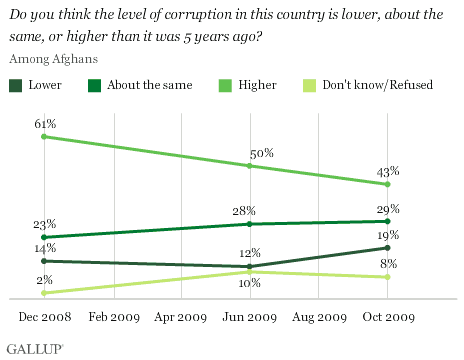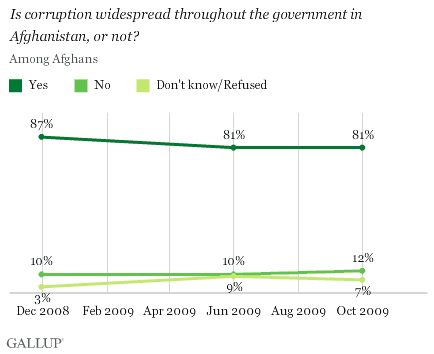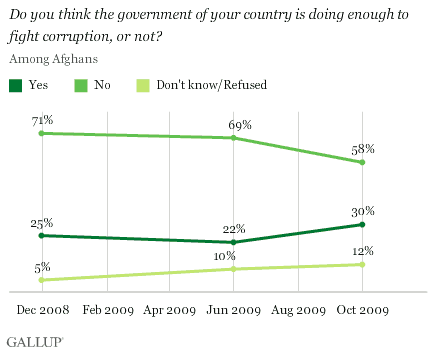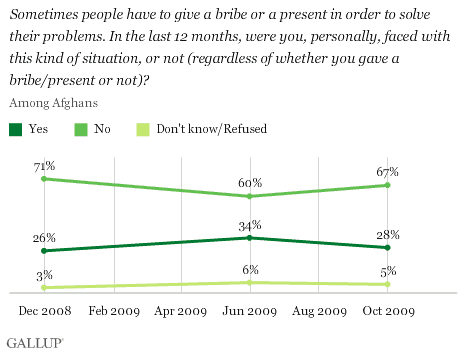WASHINGTON, D.C. -- Gallup surveys document some positive momentum in Afghans' views about the level of corruption in their country following the controversial presidential election in August last year. The number of Afghans saying corruption levels were higher than they were five years ago continued to decline, dropping below 50% for the first time in Gallup's September-October survey.

Insecurity and fears of fraud before the election and allegations of irregularities afterward mired Afghanistan's second presidential election in controversy. Gallup's survey was conducted after the Aug. 20 election, but before Afghan President Hamid Karzai agreed to a runoff against rival candidate Dr. Abdullah Abdullah that ultimately did not take place.
Although more Afghans perceived corruption levels as higher (43%) than lower (19%), the direction of the trend is an encouraging sign in a country where most continue to perceive corruption as widespread in government and business. Still, 81% of Afghans surveyed post-election said corruption was rampant in their government, unchanged from June. Slightly fewer than three in four (73%) said the same about corruption in the country's businesses -- also unchanged from the pre-election survey.

A majority of Afghans (58%) continued to perceive their government's efforts to fight corruption as insufficient, but this percentage was down from previous surveys, perhaps because of the political spotlight thrown on corruption during the election. This decline may signal an opportunity for Karzai -- who only last month reiterated his commitment to make fighting corruption the key focus of his second term -- to improve his track record with the Afghan public and Western donors.

The number of Afghans who said they personally faced a bribe situation in the last year was more in line with what Gallup observed in 2008 than before the election in 2009. Nearly 3 in 10 Afghans (28%) said they found themselves in a situation in which they had to give a bribe or a present to solve a problem -- down slightly from 34% in June 2009. These figures are much higher than in other countries in South Asia, where percentages who said they faced a bribe situation are typically less than 10%.

Bottom Line
At the 70-nation London summit on Afghanistan last month, Karzai continued to face pressure to make concrete plans to fight the corruption so endemic in his country. If Karzai keeps his commitment to fight corruption, he has the chance not only to bolster international confidence in his governance, but also to keep the positive momentum in Afghans' attitudes toward corruption.
For complete data sets or custom research from the more than 150 countries Gallup continually surveys, please contact worldpollpartners@gallup.com or call 202.715.3030.
Survey Methods
Results are based on face-to-face interviews with a nationally representative sample of 1,000 adults, aged 15 and older, conducted in December 2008, June 2009 , and September-October 2009 in Afghanistan. For results based on the sample, one can say with 95% confidence that the maximum margin of sampling error is ±4 percentage points. The margin of error reflects the influence of data weighting. In addition to sampling error, question wording and practical difficulties in conducting surveys can introduce error or bias into the findings of public opinion polls.
